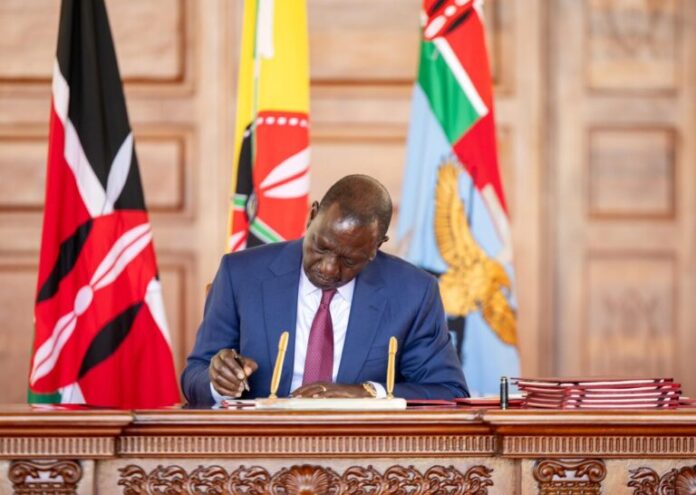By John Mutiso
President William Ruto this morning presided over a state occasion at State House Nairobi to assent to four significant bills passed by Parliament.
The event, convened under Article 115 of the Constitution, marks a decisive step in advancing fiscal, economic, and governance reforms across the country.
The first to receive presidential assent was the County Governments Additional Allocations (No. 2) Bill, 2025, a Senate proposal that reinforces the administration’s commitment to deepening devolution.
The legislation unlocks KSh 70.6 billion in additional conditional and unconditional allocations to counties for the 2025/2026 financial year, an increase of KSh 20.1 billion from the previous cycle.
The funds include KSh 9.98 billion from the national government for settling doctors’ salary arrears, supporting community health workers, and implementing the County Aggregation and Industrial Parks (CAIP) programme.
A further KSh 57.7 billion from development partners will boost county-level projects ranging from healthcare and agriculture to industrial development.
The President also assented to the Capital Markets (Amendment) Bill, 2025, a National Assembly bill aimed at revitalising Kenya’s capital markets.
The law revises regulations governing licensing and shareholding of capital markets intermediaries by removing strict shareholding limits that previously restricted investment.
By aligning Kenya’s financial markets with global standards, the amendments are expected to increase liquidity, attract large-scale investors, and improve the ease of doing business.
The new law also amends Section 29 of the Capital Markets Act to empower the Cabinet Secretary for the National Treasury to determine shareholding thresholds more flexibly.
Also repealed today was the Provisional Collection of Taxes and Duties Act of 1959, a colonial-era law declared unconstitutional in 2019 for allowing tax measures to take effect before full parliamentary approval.
The repeal restores constitutional order by affirming that all taxes must only be imposed through properly enacted legislation, as provided under the 2010 Constitution.
The ceremony concluded with the assent of the landmark Government-Owned Enterprises (GOE) Bill, 2025, which restructures the governance and operations of state corporations.
The law sets out a modern governance framework requiring transparent, competitive appointment of independent board members, and outlines stringent business logic for the creation and sustainability of government-owned enterprises.
The bill also transitions 65 commercial state corporations and 18 additional entities into a streamlined structure under the Companies Act to enhance efficiency, reduce reliance on the exchequer, and restore public trust in state investments.



















